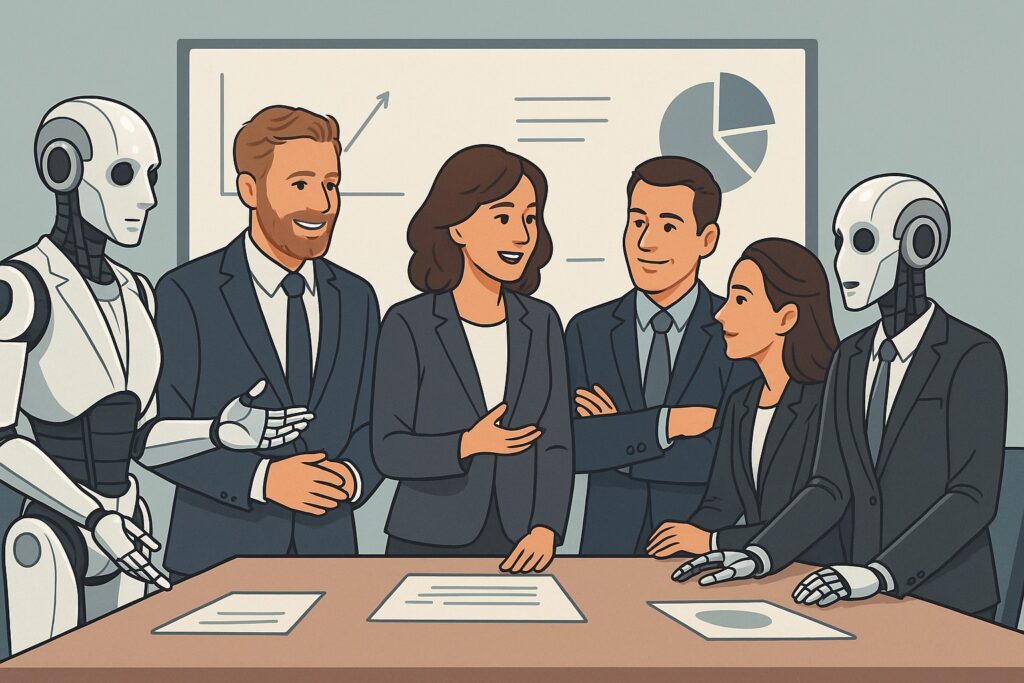
Building Hybrid Marketing Teams: AI + Human Collaboration in 20259 min read
September 8, 2025Artificial intelligence (AI) is no longer just an experiment. AI is a part of our lives now, and it’s here to stay, no matter how hard you try to fight it.
It’s embedded in nearly every aspect of how modern businesses attract, nurture, and convert customers. But AI isn’t replacing marketers, so let’s stop with the “AI is taking our jobs” rhetoric.
Instead, it’s creating a new kind of team. AI is creating hybrid marketing teams where AI and humans collaborate to achieve results that neither could accomplish alone.
Now and into the future, successful companies won’t be those that pick sides between AI or humans. They’ll be the ones that learn how to combine AI’s speed and scale with human creativity and strategy.
Platforms like HubSpot are already pushing this future forward with AI agents enhanced by proprietary data, designed to deliver context-aware automation while keeping humans in control.
I’ve been busily exploring the world of AI and how we can work with it to be better at what we do. In this article, I want to provide a bit of clarity into what hybrid marketing teams look like today, where humans and AI excel, and how businesses can build teams that thrive in this new frontier.
The Rise of Hybrid Marketing Teams
I say it all the time. Collaboration is so important for high-achieving marketing teams. Today, however, collaboration takes on a different meaning. It’s no longer just you and your human counterparts.
Marketers now have a new ally. AI is your partner. It’s your never-tiring co-worker. It selflessly takes work off your plate so you can focus on bigger picture items. Partnering with AI is not only a wise move. It’s a necessary move.
Why AI Is No Longer Optional in Marketing
AI has shifted from “nice-to-have” to “must-have.” If you’re still in the school of “AI is taking our jobs” or “AI is ruining marketing,” you’re in for a bumpy ride ahead.
According to recent studies, just about 28% of professionals are now using generative AI tools daily for activities like:
- Content creation
- Campaign optimization
- Research
- Analytics
- Campaign automation
Marketers can no longer ignore the role of AI if they want to keep up with competitors who are leveraging automation, personalization, and predictive insights.
What Hybrid Teams Look Like in 2025
Visions of marketers and robots huddling in a conference room? Don’t worry. When I refer to “hybrid teams,” that’s not what I mean. AI has a way of making people’s imaginations run wild.

In this case, a hybrid team is one where AI and humans complement each other’s strengths. AI handles repetitive, data-driven tasks like lead scoring, A/B testing, and audience segmentation. Humans (you and me) provide the creativity, ethical oversight, and strategic decision-making that machines can’t replicate.
For example:
- AI generate initial ad copy variations, predict which audiences are most likely to engage, and recommend optimal timing.
- Humans then refine the messaging for tone, align it with the brand story, and ensure it connects emotionally with the target audience.
This dynamic not only increases efficiency but also helps your team identify new opportunities for experimentation and growth.
The Strengths of Humans in Marketing
Dating back 40,000 or more years to the first cave painting, human beings have been telling stories. Storytelling continues to play a major role in our society. Its impact, arguably, can be felt more in marketing than many other professional fields.

Creativity and Storytelling
Marketing is, at its heart, about connection. While AI can mimic language patterns, it can’t truly understand cultural nuance, humor, or the emotional resonance of a well-crafted story.
Human marketers excel at crafting narratives that build trust and loyalty. Campaigns like Dove’s Real Beauty or Nike’s Just Do It are timeless reminders that creativity rooted in human insight drives real impact.
Strategic Thinking and Ethical Oversight
Humans also bring judgment. They can evaluate when a campaign idea feels “off” or when an AI-generated suggestion might unintentionally cross ethical lines. More importantly, humans understand the long-term implications of branding and customer relationships, something AI still struggles to grasp.
The Power of AI in Modern Workflows
AI helps busy brands improve workflows and bake efficiency into every effort. Below are just a handful of the powerful changes you’ll see when you integrate AI into your marketing.
Automation of Repetitive Tasks
One of AI’s biggest contributions is freeing marketers from time-consuming tasks. Scheduling social posts, creating nurture workflows, setting up A/B tests, and other marketing tasks can now be automated, allowing human marketers to focus on creative and strategic work.
Data Analysis and Insights
AI thrives on data. It can analyze vast datasets in seconds, surfacing insights that would take humans weeks to uncover. From predicting customer churn to identifying micro-trends in behavior, AI gives marketers the ability to act on information faster and with greater precision.
Personalization at Scale
Customers expect personalization, but tailoring messages to thousands of individuals isn’t realistic for humans alone. AI makes it possible to deliver dynamic, relevant content at scale. It helps your team easily adjust subject lines, improve offers, and create better calls-to-action based on each person’s behavior and preferences.
Case Example: HubSpot’s New AI Agents
Forward-thinking brands are finding unique ways to leverage AI to improve the offerings they bring to market. HubSpot has always been one of my favorite go to examples of doing marketing the right way. My opinion stands when it comes to the brand’s incorporation of Breeze AI agents into its software.
What They Are
HubSpot’s latest AI advancements include “Breeze” AI agents built directly into its CRM and marketing platform. Unlike standalone AI tools, these agents are powered by proprietary data and designed to be trustworthy, context-aware, and under human control.
How They Enhance Hybrid Teams
Imagine a sales lead enters your CRM. HubSpot’s AI can automatically score the lead, assign it to the right rep, and suggest next steps based on past patterns. Meanwhile, a human reviews those insights, adjusts the scoring model if needed, and crafts a personalized outreach strategy.
By combining machine precision with human oversight, HubSpot ensures that workflows are both efficient and strategically sound.
Unlike the unfounded horror stories circulating around the web, these agents don’t replace team members. They empower them to spend more time building relationships and less time clicking through dashboards.
Best Practices for Building Hybrid Teams
It’s tempting to jump on the latest trend and start rolling, but that’s never the best way to integrate new technology into your operations. To truly benefit from merging the strengths of AI and humans, the key is to have a strategy and put some rules in place to guide you.
To help you get started down the right path with AI, here are five steps you should take to ensure success.
1. Define Roles Clearly
Set clear expectations for what AI will handle versus what humans are responsible for. Here are a couple of simple examples.
- STEP ONE: AI drafts blog posts or outlines.
- STEP TWO: Humans edit for tone and insert anecdotes, links, and more.
OR
- STEP ONE: AI scores leads and assigns them.
- STEP TWO: Sales reviews and prioritizes outreach.
2. Invest in Training & Change Management
Marketers need to learn how to work with AI, not just around it. Training on prompting, reviewing outputs, and identifying when AI is wrong is crucial. Teams that embrace AI literacy will outpace those that resist change.
3. Prioritize Trust and Data Security
AI is only as good as the data it’s fed. Using clean, proprietary data helps ensure reliable outputs. Equally important is setting governance policies for how AI is used, ensuring compliance, data security, privacy, and brand safety.
4. Encourage Collaboration, Not Competition
AI should be seen as a partner, not a replacement. Encourage teams to use AI for brainstorming and idea generation while retaining human control over strategy and execution.
5. Measure Success with Balanced Metrics
Don’t just measure efficiency. Track improvements in campaign creativity, customer engagement, and long-term ROI. Balanced metrics prevent teams from over-focusing on automation at the expense of brand connection.
Challenges and Pitfalls to Watch Out For
Hybrid AI-human teams are not without their challenges. If you’re thinking about adopting AI into your marketing, keep a keen eye out for these potential challenges and pitfalls.
Over-Reliance on AI
AI can generate lots of content quickly, but without human input, it risks sounding generic or disconnected from brand values.
Data Bias and Quality Issues
If your CRM data is incomplete or inaccurate, AI will amplify those flaws. Data hygiene is non-negotiable in a hybrid model.
Change Fatigue in Teams
Introducing new tools too quickly can overwhelm staff. Hybrid adoption should be phased, with clear communication and leadership buy-in.
The Future of Hybrid Marketing Teams
Feeling like you’re in the early stages of a sci-fi flick? Wild, right? The thing is, we are only in the infant stages of AI.
Marketing is at the forefront of this robot revolution. Marketers are leading the way, testing new tools, automating mundane processes, and partnering with AI to build teams that are 10x more powerful than anyone could have imagined just a few years back.
Here are a few predictions we have for the near future of AI and hybrid marketing.
Shifts Coming in 2025 and Beyond
- Conversational AI interfaces becoming standard in CRMs.
- Specialized AI “co-workers” designed for industries like healthcare, finance, or retail.
- Even deeper personalization powered by real-time data streams.
Why Human Creativity Will Always Lead
No matter how advanced AI becomes, humans will remain the architects of vision, culture, and creativity. Businesses that find the balance between AI enablement and human ingenuity will lead their industries in innovation and trust.
The Future is Now. Embrace the Robots.
Hybrid marketing teams are not the future. They’re happening right now. At least in the wisest of organizations anyway.
Businesses that embrace AI as a collaborator, not a competitor, will be the ones building stronger brands, forging deeper customer relationships, and driving measurable growth.
AI brings speed, data, and scale. Humans bring creativity, empathy, and strategy. Together, they form a powerful team that is greater than the sum of its parts. Think Batman and Robin, Jordan and Pippen, Mickey and Minnie. You get the point, right?
For organizations ready to explore what hybrid marketing could look like for their business, now is the time to act. Start with small steps, build AI literacy, and design a model where both humans and AI thrive.
If you’re looking for support with your organization’s digital transformation, the Sharp Innovations team offers business consulting services to help you make the move. Contact us today to set up a complimentary consultation.

Anthony is Chief Marketing Officer (CMO) at Sharp Innovations. He is a two-time published author and award-winning marketing & brand strategist. He has helped brands both large and small grow and thrive across multiple industries through strategic marketing campaigns and leveraging a powerful network of influencers.